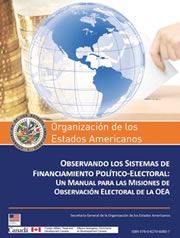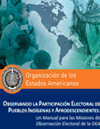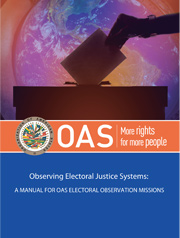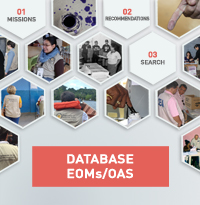- Español
- English
Methodologies
DECO has developed specific methodologies to observe key aspects of electoral processes.Having followed the political and institutional developments in the region, the Organization of American States has designed the current methodology in an effort to professionalize the analysis of electoral justice systems. Based on international standards in the field, this resource will allow for the formulation of observations and recommendations that will help to perfect electoral dispute resolution mechanisms.
This methodological guide establishes a conceptual framework for OAS Electoral Observation Missions (OAS/EOMs), outlining the principles, components and objectives of a mission. It introduces the concept of democratic elections and examines the two main sources of information used by OAS/EOMs: the Election Day Questionnaire completed by international observers and the Document of Indicators on the Electoral Process.
The “Manual for Incorporating a Gender Perspective into OAS/EOMs” provides the tools to analyze the participation of men and women in various stages of the electoral process: as voters, as candidates, within political party structures and electoral institutions, and in the process of organizing and administering elections. The information gathered by the methodology serves to identify the factors that directly and indirectly affect the ability of women to participate fairly in the electoral process. OAS/EOMs use this information to draft specific recommendations about women’s political participation and encourage Member States to bolster their efforts to ensure the equal treatment of men and women in the electoral process.

This manual outlines concepts, procedures and tools used to analyze political financing systems in elections observed by the OAS. The criteria established in this manual enable observers to evaluate the degree to which the financing systems are equitable and transparent, both in the pre- and post-electoral period. The methodology includes a preliminary study, visits to the observed country to collect information, and interviews with key actors in the electoral process. The information gathered is used to produce a final report with conclusions and recommendations for promoting greater equity and transparency in the financing system.
 Access the full text here
Access the full text here
 This methodology establishes the parameters used to monitor media coverage during OAS/EOMs, facilitating analysis on the equity of the electoral process. Indicators observed include access of political parties and candidates to media, the balance of news coverage, compliance with the law (if applicable) and coverage of topics related to voter education. This methodology is generally implemented in presidential elections.
This methodology establishes the parameters used to monitor media coverage during OAS/EOMs, facilitating analysis on the equity of the electoral process. Indicators observed include access of political parties and candidates to media, the balance of news coverage, compliance with the law (if applicable) and coverage of topics related to voter education. This methodology is generally implemented in presidential elections.
 Access the full text here
Access the full text here
Observing the Use of Electoral Technologies: A Manual for OAS Electoral Observation Missions

The methodology outlined in this manual facilitates the observation of highly technical processes, enabling specialists to observe candidate registration, the electoral registry, electoral cartography, electronic voting, the transmission of results and the modernization of documents required to vote. The manual details the role of the specialist on electoral technology within the OAS/EOM core group.
 Access the full text here
Access the full text here
in Electoral Processes

DECO has developed a new methodology focused on identifying obstacles and limitations faced by people of African descent and indigenous populations when exercising their political rights. Impediments include barriers to voting, becoming a candidate and being elected. Implementing this methodology will enable OAS/EOMs to formulate specific recommendations that promote measures to improve the inclusion of members of these two groups in electoral processes in the Hemisphere.
 Access the full text here
Access the full text here
Department of Electoral Cooperation and Observation
1889 F St., N.W.Washington, D.C., 20006
E-mail: deco@oas.org
Phone: (202) 370-4526
Fax: (202) 458-6250













